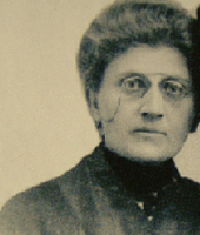
1870 – 1959
Mariam Dadiani was born in the village of Sviri on 18 December 1870. Because of early death of her mother, Mariam and her brother, Shalva Dadiani, were brought up by their father Niko Dadiani who gave secondary education to his children at home.
Mariam Dadiani married a renowned Abkhaz public figure, Tarash (Taras) Anchabadze. She actively engaged in cultural and educational activity of Sokhumi. Upon the initiative of Mariam Anchabadze, a unit of the Society for the Spreading of Literacy Among Georgians was established in Sokhumi in 1903. She chaired the board of this unit for years. The Society founded a Georgian school in Sokhumi in 1910. Owing to Mariam Anchabadze’s tireless efforts and work, Russians introduced the teaching of Georgian language in civic educational institutions since 1900.
With the assistance of Mariam Anchabadze, performances were organized in Sokhumi whilst in cooperation with the theatre companies of Tbilisi and Kutaisi, Georgian plays were periodically staged. Revenues was used for charity activities.
Speech made by Mariam Anchabadze at the meeting of
Church Assembly in Tbilisi on 15 September 1917
“By the will of almighty women have great mission in our religion….
“A woman gave birth to the god. When this woman was very young, her parents took her to a temple and a bishop took this young Mary into that holy place where, except religious servants, even men were prohibited to enter….
“Even if the current revolution has not happened and has not brought, among other things, the slogan of equality of women, the belief of Christ teaches this equality. To this end, we, women, necessarily demand that we be given an adequate place in the religious affairs, in the spiritual entity; I personally, as a chair of association of Georgian women of Sokhumi, defend the principle of equality and demand that women be allowed not only as psalm readers but also be granted the right to preach in churches and in general, perform missionary responsibilities. The only thing which I, as a religious woman by tradition, deem impossible is women being ordained as priests or consecrated as bishops and in general, performing religious services because according to our current belief, priests and bishops are replacements of Christ and apostles and it is more suitable for men to be these replacements.”
The newspaper Voice of Georgian Woman,
issue #27, 19 October, 1917

